Last Updated on
“I want to start blogging but I’m not a very good writer.”
Maybe you’ve thought that before. And if we’ve spoken one-on-one, there’s a good chance you’ve uttered those exact words to me.
Here’s the truth: most people I speak with tell me they don’t consider themselves a writer.
And I can understand why!
Writing feels intimidating. There’s immense pressure to organize your thoughts in an elegant way without sounding clunky.
But if you have a business, writing is a non-negotiable skill. Everywhere you turn, you’re faced with tasks that require writing: Blog posts, email newsletters, Instagram captions, Facebook ads, and Tweets (just to name a few).
Enhancing your writing will help you connect and communicate with your audience so you can grow your biz. So today, I want to share my favorite writing tools to help you improve your prose!
This article contains affiliate links. If you choose to make a purchase through a link in this article I will earn a commission at no extra cost to you.
Books and Courses
1. Grammar Girl’s Quick and Dirty Tips for Better Writing
If grammar isn’t your forte, you’ll love Grammar Girl’s course: Quick and Dirty Tips for Better Writing.
I loved this course because I was able to finish it in one day. It’s to-the-point, fun to watch, and packed with actionable writing tips.
This course is free on two different platforms (as long as you have a membership).
First off, premium LinkedIn users can enroll in Grammar Girl’s course for free. Luckily, LinkedIn offers a free 30 day trial of their premium membership, so you can take the course during your free trial if you choose to sign up.
You can also take this course on Lynda. Many public libraries offer free Lynda memberships so it’s worth checking if your library includes access with a membership.
2. Everybody Writes
Everybody (whether you consider yourself a writer or not) should read Everybody Writes by Ann Handley.
This breezy read will catch you up on writing basics and provide simple tips to drastically improve your writing.
Whether you’re crafting social media copy (Instagram captions, tweets on Twitter or Facebook ads) or you need to write landing page copy for your latest product, Everybody Writes will help you jazz up your text so its compelling and enjoyable to read.
Software
3. Grammarly
If I could only use one tool to help me write for the rest of my career, it would be Grammarly (affiliate). Grammarly is a free and premium tool to help you catch errors and polish your writing.
The free version is a great place to start. But if you’re wanting a bit more, the premium version will give you access to even more handy features.
The premium version:
- suggests sentence re-writes for clarity and brevity
- highlights overused phrases and boring words, while giving you suggestions so your writing isn’t bland
- gives you access to plagiarism detection: a must for those who outsource their writing
- allows you to tailor the editor based upon your goals (pictured below) where you can set the audience, formality, domain, tone and intent of your piece
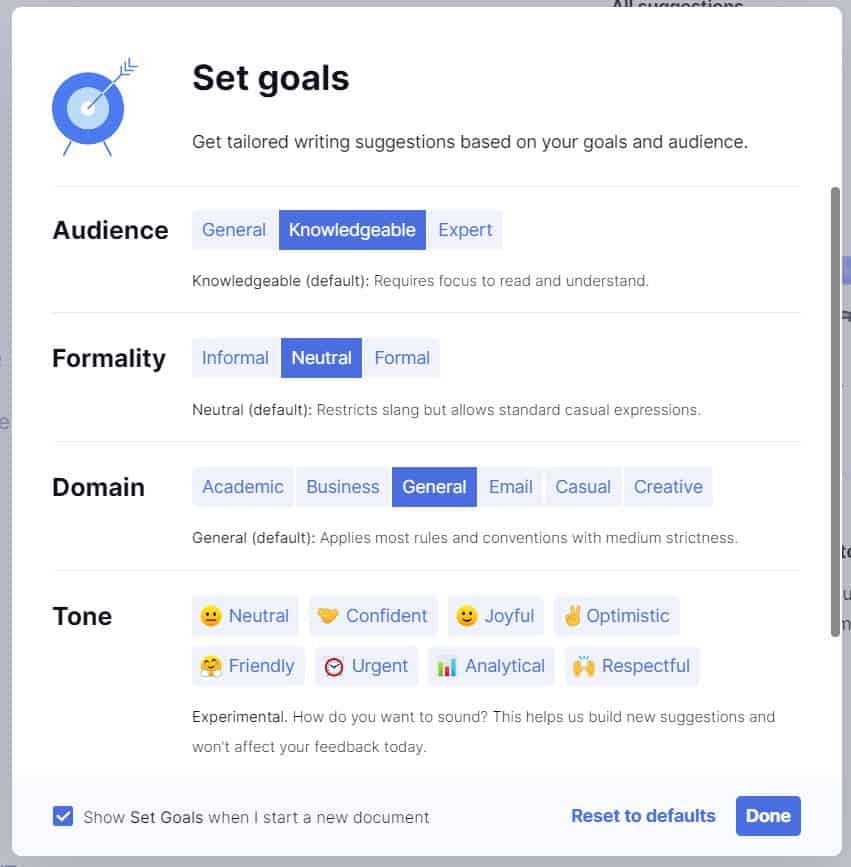
I’ve been using the premium version of Grammarly for a couple of years now and absolutely love it. It integrates with Microsoft Word, Google Docs, WordPress and many other apps.
Read my in-depth Grammarly review to get a better understanding of how Grammarly will make you a better writer.
4. CoSchedule’s Headline Analyzer
Another free writing tool you’ll love is CoSchedule’s Headline Analyzer. CoSchedule’s tool will analyze your headlines and give you a score, along with tips to help you improve your headlines.
Here’s an example I put in: “Feeling sad? 10 fast ways to overcome homesickness“.
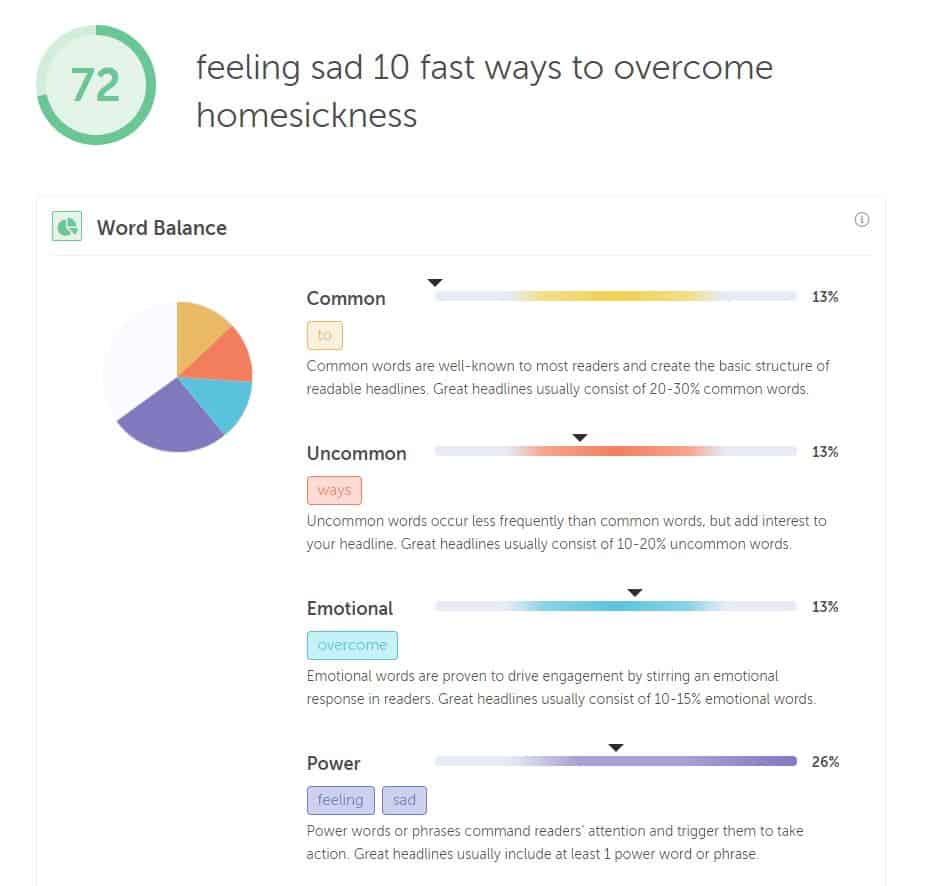
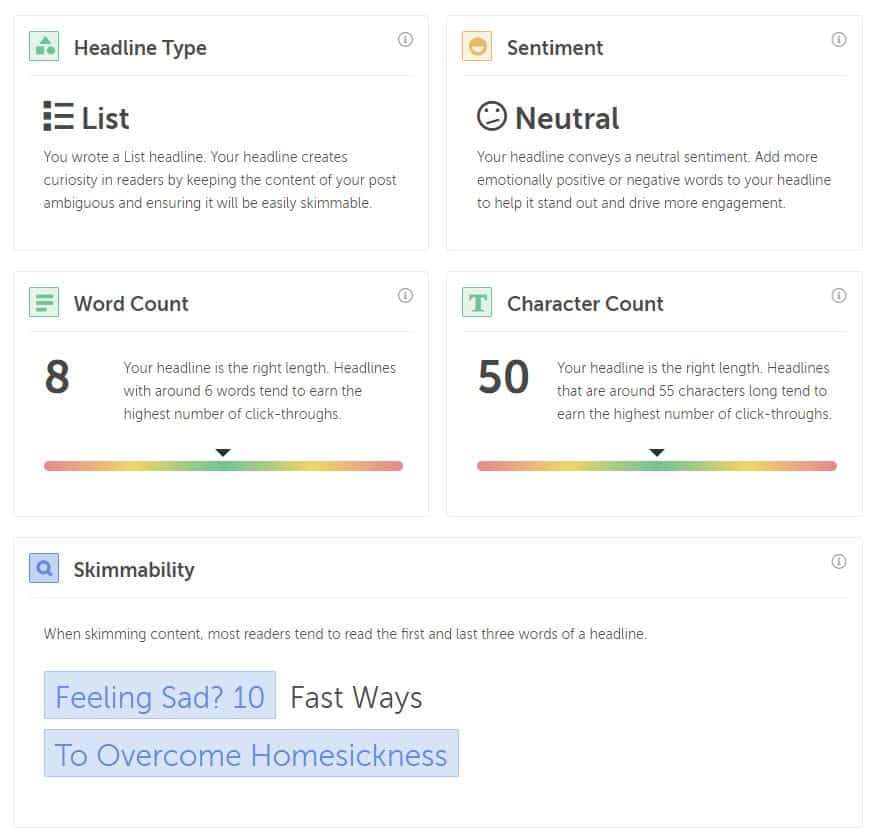
CoSchedule gave me a score of 72 (out of 100) along with a breakdown of my headline, and tips to improve my score!
5. Hemmingway App
When writing online, you should aim to write at an eighth-grade level. Of course, this depends on your audience; writing to a bunch of scholars with PhDs? Grade 8 writing likely won’t cut it.
But most adults read anywhere from a sixth grade to 12th-grade reading level.
Hitting that sweet spot around grade eight ensures your audience can understand what you have to say and will be more likely to convert.
Katelyn Bourgoin sums it up nicely:
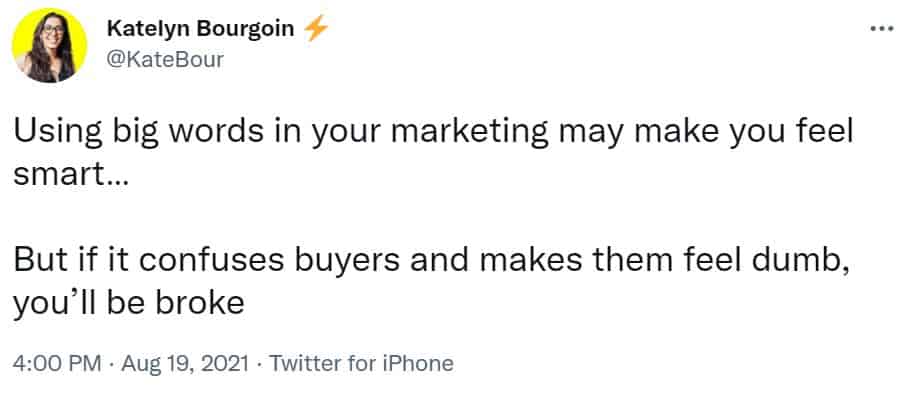
Here’s where the Hemingway App comes in.
The Hemingway App will grade your writing automatically so you know whether or not it’s suitable for your audience.
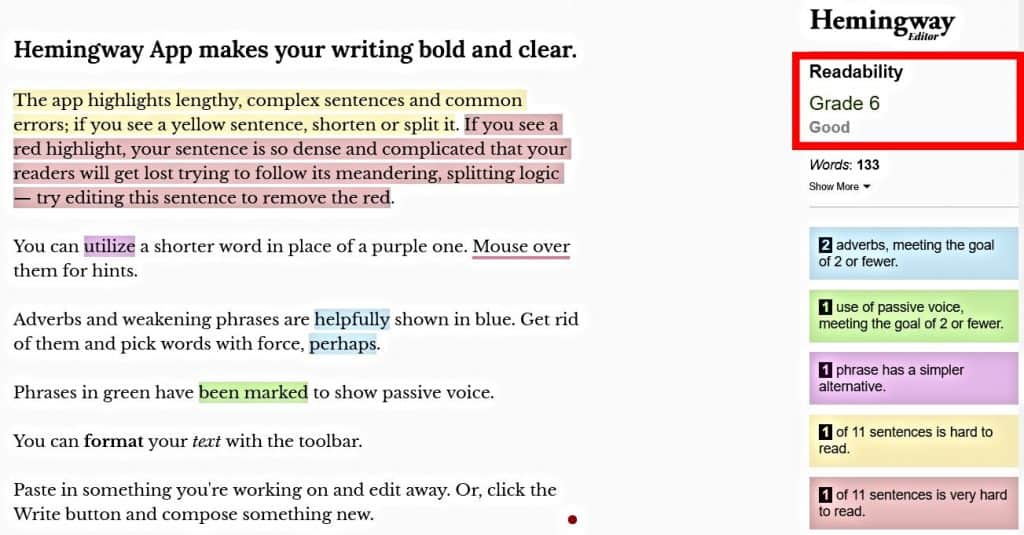
But remember: grade eight is just a suggestion for the average internet user. You should research your audience and determine their reading level and write at the level best for them.
6. 750 Words
In one of my University courses, we spent the first 15 minutes of every class writing in our private notebooks. There was only one rule: no erasing allowed. And nobody, not even our professor, would read our notebooks.
The purpose? To warm flex our writing-muscles.
Enter 750 Words.
750 Words digitizes this concept. A few times a week, log into your 750 Words account and write. The idea is to write 750 words per day, but honestly, I recommend doing what feels natural; forcing yourself to write may make you loathe it over time.
Here’s my latest except from 750 words, where I wrote about snow:

The above writing won’t win a noble prize, however, I still enjoyed writing without any rules.
7. Cliché Finder
- “The apple doesn’t fall far from the tree.”
- “Home is where the heart is.”
- “If you play your cards right.”
The above are all examples of clichés, and within your writing, it’s best to limit them as much as possible.
But why?
Typically, clichés are specific to language and region, so they likely won’t make sense to all your readers. They’re also overdone and boring.
This is something I’m working to improve; my work is sprinkled with clichés.
Cliché Finder highlights clichés in your writing so you can replace them with more vibrant language.
Time to Become a Better Writer!
You know the tools, now it’s time to put it into action. Take the next 15 minutes to write whatever you want, either on your laptop or pen to paper. Schedule time into your day to write and see how much you improve over the next month.
You got this!
This article may include affiliate links. As an Amazon Associate I earn from qualifying purchases.

Dana Nicole is an award-winning freelance writer for MarTech/SaaS who was rated one of the best SaaS writers by Software World. She specializes in writing engaging content that ranks high in search engines and has been featured in publications like Semrush, ConvertKit, and Hotjar.
Dana holds a Bachelor’s degree in Business Administration and has over 15 years of experience working alongside national brands in their marketing departments.
When Dana’s not working, you can find her dancing en pointe, cooking up new recipes, and exploring the great outdoors with her two big dogs.


Thanks Dana for these writing tools, I fell in love with 750 WORDS instantly and signed up straight away.
We appreciate all you do for the online community.
Best!
Eulyn
Glad you enjoyed it!! Thank you for your kind comment 🙂